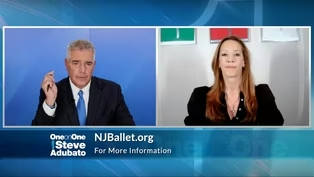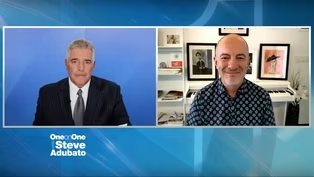One-on-One
The Impact of Space Weather on our Daily Lives
Clip: Season 2023 Episode 2663 | 7m 11sVideo has Closed Captions
The Impact of Space Weather on our Daily Lives
Andrew Gerrard, Ph.D., Director of the Center for Solar-Terrestrial Research and Professor & Chair of the Department of Physics at NJIT, joins Steve Adubato to discuss the complexity of space weather and the significant impact it has on our day-to-day life.
Problems playing video? | Closed Captioning Feedback
Problems playing video? | Closed Captioning Feedback
One-on-One is a local public television program presented by NJ PBS
One-on-One
The Impact of Space Weather on our Daily Lives
Clip: Season 2023 Episode 2663 | 7m 11sVideo has Closed Captions
Andrew Gerrard, Ph.D., Director of the Center for Solar-Terrestrial Research and Professor & Chair of the Department of Physics at NJIT, joins Steve Adubato to discuss the complexity of space weather and the significant impact it has on our day-to-day life.
Problems playing video? | Closed Captioning Feedback
How to Watch One-on-One
One-on-One is available to stream on pbs.org and the free PBS App, available on iPhone, Apple TV, Android TV, Android smartphones, Amazon Fire TV, Amazon Fire Tablet, Roku, Samsung Smart TV, and Vizio.
Providing Support for PBS.org
Learn Moreabout PBS online sponsorship(upbeat music) - We're now joined by Dr. Andrew Gerrard, professor of physics and director of the Solar-Terrestrial Research Initiative at NJIT.
Good to see you, Doctor.
- Yeah, thank you, likewise.
- Let me also say, NJIT is on of our longtime higher ed partners, helping us understand innovation, science, technology.
By the way, what exactly is space weather?
Because that's why you have us here.
I'm reading, saying, "I don't get it, help us."
- Yeah, so you know, every day we have different weather here.
You see rain, clouds, sun, it feels like we've been in rain for a while now.
But the same thing happens outside of Earth's atmosphere in space.
The sun is putting out constant energy, it varies day to day to day, week to week, month, even on yearly cycles.
And that variation impacts spacecraft and power grids and HF radio and GPS and everything else that is really communication oriented.
What we're trying to do is do forecasts of that environment, just like we do forecast for the daily weather.
- What's the connection between space weather and New Jersey?
- Yeah, we've actually got one of the, in New Jersey, one of the largest solar-terrestrial space weather groups in the country.
And it kinda just happened naturally where we were developing an application-oriented program at NJIT, and there was this need to know how space weather, how the sun is impacting different technologies.
So as we just kinda grew and developed this niche little region, we created this wonderful center, Center for Solar-Terrestrial Research at NJIT, that has, yeah, really fostered a lot of the space weather initiatives that we see going on in the US right now.
Our senator has been very active in promoting these types of things.
- Which senator?
- Sorry, Senator Booker.
- Cory Booker.
- Yeah.
- Question, connect space weather, Dr. Gerrard, back to our everyday lives.
Give us a couple of concrete examples of how space weather impacts our lives, so people can say, "Oh, that's space weather."
- Yeah, so if you're ever using your GPS, for example, on your phone, there are times that you lose your location or you can't find, exactly, you can't track your kids' phones, or something like that.
It's not necessarily the phone itself or, you know, the cell provider, it can actually be, for example, a solar flare.
We know that when the sun... - Solar what?
- Solar flare.
- Go ahead.
- Yeah, these are radio emissions, which basically drowned out GPS, and you lose that GPS lock for two or three seconds.
Now, two or three seconds to you and I, when we can't find ourselves on a freeway or something, it's not that horrible.
But if you're an aircraft coming in for a landing.
- Ooh.
- Yeah, yeah, that's some very real consequences.
If you're launching a rocket, you name it.
GPS has really become a dominant means of tracking, identifying your position, and that information is crucial for a lot of different assets.
- A great example.
Space weather and bird migration.
- Yeah.
We know that animals, as they migrate, they're much more sensitive, much more receptive, to the background magnetic field.
And when we have... - Hold on one second.
There's a lot of language that is familiar to you.
What'd you call it again?
Background what?
- Yeah, the background, normal magnetic field around the Earth, the one that we use for compasses and, you know, finding which way is north and getting... - Oh that, okay, all right.
- Yeah, it's there, but... - I still don't know, but go ahead.
- It's there, but it varies.
- Okay.
- We don't know that, but birds, animals, deer, they actually can track and sense that variation of the magnetic field.
And this is what (indistinct) migrating?
- Do they rely on it, Doctor?
- Yeah, this is how they tell which ways north and south.
When that varies, so to do their their flight patterns, for example, with carrier pigeons.
- Wow.
Climate change and space weather, please.
- Yeah, so, again, the source of much of the space weather is the sun itself.
And as the sun is changing, there can be impacts, certainly, on the Earth's climate.
Right now, we know that the sun does it vary too much in the visible portion of the spectrum or the radio.
But in the ultraviolet, there's still some unanswered questions as to how much of our climate is impacted by that solar variation.
- Andrew, how'd you become fascinated with this area of science, technology?
- Yeah, so as a student in college doing physics, I had a moment where I had to ask myself, "Okay, do we do this for the theory or do we do this for some part of application?"
And although I love the plasma physics, just the theory aspects, I needed to look myself in the mirror.
So, you know, the application of that and and the growing technologies of the '90s, 2000s with GPS, it just kinda worked naturally.
- Important stuff.
You've been listening to and watching Dr. Andrew Gerrard, professor of physics and director of Solar-Terrestrial Research at NJIT, one of our higher ed partners.
Andrew, thank you so much for joining us, we appreciate it.
- Thank you much.
- You got it.
Stay with us, we'll be right back.
- [Narrator] One-On-One with Steve Adubato has been a production of the Caucus Educational Corporation.
Funding has been provided by Community FoodBank of New Jersey.
New Jersey Sharing Network.
The Turrell Fund, supporting Reimagine Childcare.
Hackensack Meridian Health.
The North Ward Center.
NJ Best, New Jersey'’s five-two-nine college savings plan.
Johnson & Johnson.
The Fidelco Group.
And by Horizon Blue Cross Blue Shield of New Jersey.
Promotional support provided byROI-NJ.
And by Insider NJ.
At the Community Food Bank of New Jersey, we are working now more than ever to fill the emptiness caused by hunger.
We are the state's largest anti-hunger organization.
And together with our 800 plus community partners, we are committed to delivering food, help, and hope, to our hundreds and thousands of neighbors in need.
The Challenges Facing the Performing Arts Community Today
Video has Closed Captions
Clip: S2023 Ep2663 | 9m 54s | The Challenges Facing the Performing Arts Community Today (9m 54s)
Using the Orchestra to Unite Communities
Video has Closed Captions
Clip: S2023 Ep2663 | 10m 49s | Using the Orchestra to Unite Communities (10m 49s)
Providing Support for PBS.org
Learn Moreabout PBS online sponsorship
- News and Public Affairs

Top journalists deliver compelling original analysis of the hour's headlines.

- News and Public Affairs

FRONTLINE is investigative journalism that questions, explains and changes our world.












Support for PBS provided by:
One-on-One is a local public television program presented by NJ PBS

